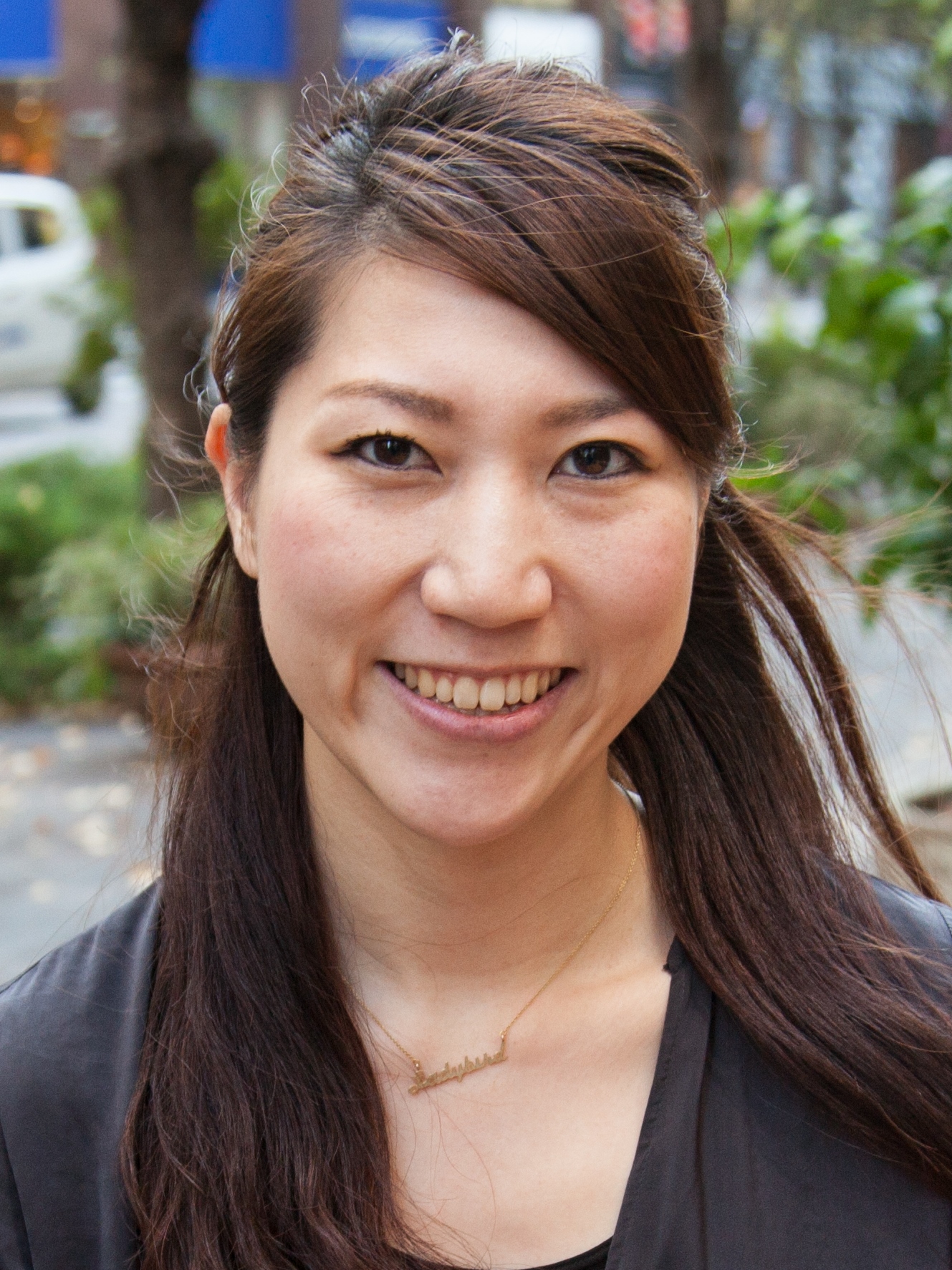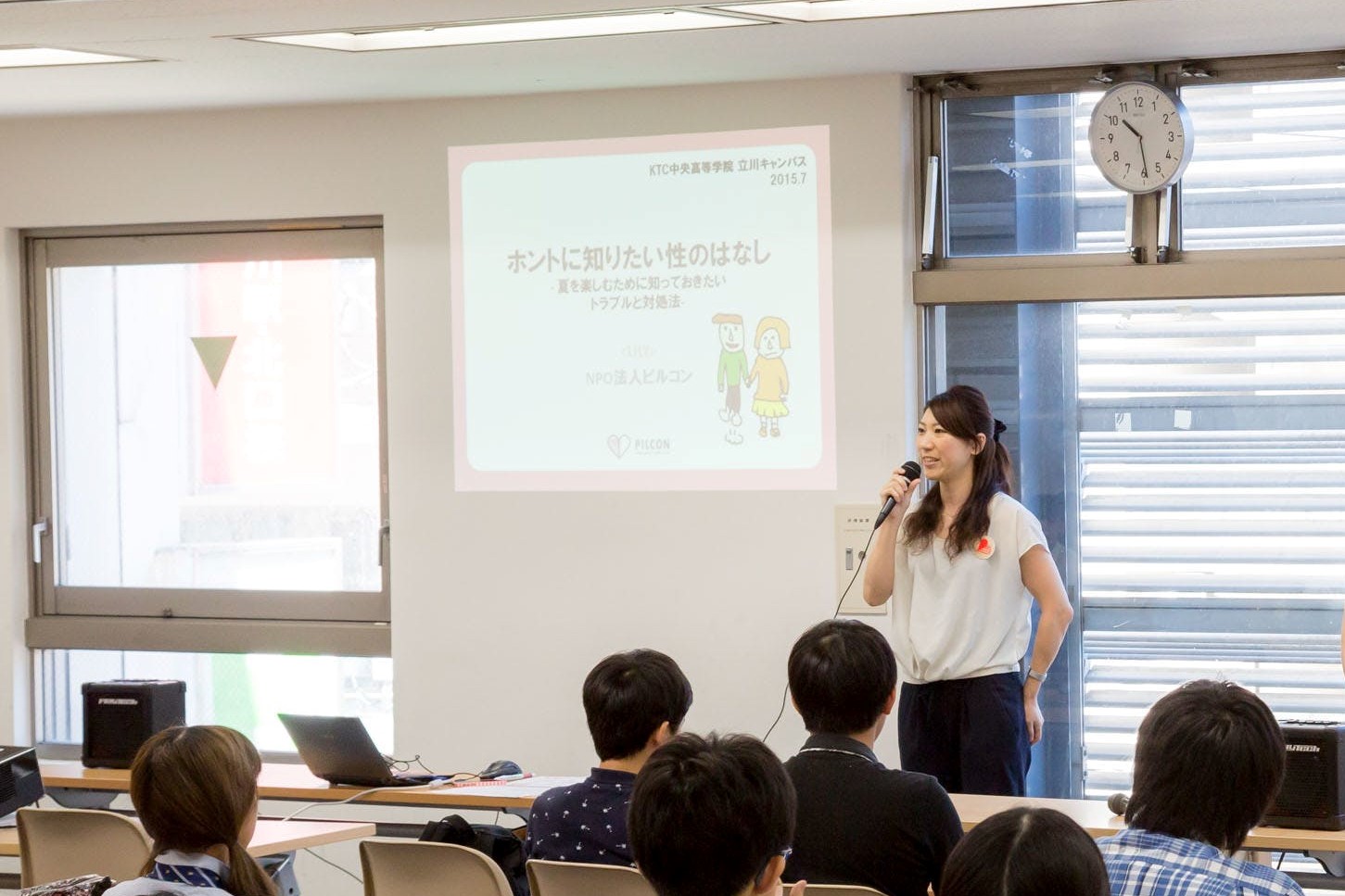Tokyo Sexual Health interview
Ms. Asuka Someya, President, NPO Pilcon

The non-profit organisation Pilcon is involved in raising awareness of the prevention of unwanted pregnancies and sexually transmitted diseases, spreading correct sexual knowledge, as well as supporting people to plan their life and careers regardless of their gender. We spoke to Asuka Someya, the chairperson of the board of directors, about the significance of learning about sex and what can be learned from this.
My own experience led to the establishment of Pilcon
 Many young people suffer from unexpected pregnancies, abortions and sexually transmitted infections, even though they are just being in love. I myself had an unexpected pregnancy when I was 20 years old, in my third year of university. After a very difficult time, I decided to have an abortion because I thought it would be difficult to have and raise a child at this point in my life, but it was a very painful experience. I regretted that I did not have the right knowledge, but I also realised at that time that many of my friends were in the same situation as me and do not know when such experience would happen to them as well.
Many young people suffer from unexpected pregnancies, abortions and sexually transmitted infections, even though they are just being in love. I myself had an unexpected pregnancy when I was 20 years old, in my third year of university. After a very difficult time, I decided to have an abortion because I thought it would be difficult to have and raise a child at this point in my life, but it was a very painful experience. I regretted that I did not have the right knowledge, but I also realised at that time that many of my friends were in the same situation as me and do not know when such experience would happen to them as well.
Pregnancy is a major life issue. That's why I thought it was necessary to learn about it properly, In 2007, I set up a student organisation, a contraceptive awareness group called Pilcon. After that, it became an organisation of volunteers, mainly working people in their 20s and 30s, and has been active as a non-profit organisation since 2013.
The lack of knowledge about pregnancy, abortion and sexually transmitted diseases among young people is largely due to the lack of opportunities to learn about them. In the course of my studies on sexual health, I have strengthened my belief that everyone has the right to know how to prevent unwanted pregnancies, what options are available to them if they do become pregnant, and where and what kind of care they can receive.
Everyone has the right to 'comprehensive sex education'

There is still an awkwardness in talking about sex in Japanese society, and there is still a strong misconception that sex education equals to actually teaching about sex, that promotes increased sexual behaviour or sexual activities among young people.
However, many books on sex education have recently been published. The national government has also started to work on education to achieve sexual health, mainly by producing teaching materials and guidance guides to strengthen the fight against sexual crimes and sexual violence, as part of the 'Safety Education for Life (Life)'※1.
Internationally, the Declaration of Sexual Rights was adopted by the World Society for Sexology (now the World Society for Sexual Health) in 1999, indicating that everyone has the right to receive 'comprehensive sex education'.
Inclusive sex education' is defined as 'curriculum-based sex education based on respect for human rights, including gender equality and sexual diversity, with the aim of sexual health, well-being and dignity, and realising the right to live with satisfaction, not just the absence of physical ailments'.
It is characterised by a learner-centred, interactive approach to teaching, which helps students to develop appropriate attitudes and specific skills as well as knowledge on their sexuality.
We originally disseminated information on contraception as well, but we feel the need to broaden the topics we deal with to include understanding human rights and sexual diversity as a foundation, the gender gap in the background, sexual violence and healthy relationships. The International Guidance on Sexuality Education※2, an international guideline for sexuality education, states that the benefits of 'comprehensive sexuality education' include a later age of first intercourse, less frequent sexual intercourse, fewer sexual partners, less risky behaviour, increased use of condoms, increased use of contraceptives and the ability to be oneself. The report also states that this can lead to an improved sense of self-esteem that it is okay to be unique and have your own way.
Men also struggle to be positive about sex
The Pilcon website has a page called the HAPPY LOVE GUIDE for solving relationship and sexual problems and questions, where the most commonly viewed page is the 'Male Body' page. Also, on AMAZE, which translates sex education videos from abroad, a lot of content on male sexuality and masturbation is viewed, reminding us once again that men are also struggling with sexuality. I think there are a lot of people who can't be positive about sex and are struggling with it, even though they can't openly say so.
Many people have been instilled with the value that it is good to experience sex early and that ejaculation is a natural part of sex, but insertion and ejaculation are only one variation of sex. If adults properly convey to boys and girls that sex is essentially a comfortable form of communication in which both parties respect each other, they will come to understand sex as something wondeful and fulfilling. I believe it is the responsibility of adults and society to protect children's sexual health in this way.
In a society where sexual health and rights are protected.
Pilcon has developed the Pilcon Email Consultation, which provides free answers to questions about contraception, pregnancy and sex, and the Pilcon's "I might be pregnant" Consultation, a chatbot that instantly and automatically responds with information on doctor-supervised contraception, testing and support sources for all those with pregnancy concerns.
The most common consultations received here are about sexuality, in addition to 'I might be pregnant' and 'I might have a sexually transmitted disease'.
Sexually transmitted diseases are difficult to discuss with those around you, but they are by no means a special disease and anyone can get them. I was once told by a sexologist that I was very impressed by his words: 'Just as you can get sick to your stomach if you start eating and sick to your lungs if you start breathing, anyone can get a sexually transmitted disease if they start having sex'.
If you get a sexually transmitted infection, don't blame yourself. If you feel strange, go to a hospital and be positive that you are lucky to have been treated quickly, which is exactly what learning about sex means.
In the case of pregnancy, I would like to normalize the concept of, everyone can seek a healthy and happy path without hurting yourself more than necessary, that you can work on and take care of your body and mind and can receive appropriate care.
To achieve this, we believe it is necessary to create an environment where people can immediately seek advice and receive appropriate support without getting blamed, and everyone needs to be aware of this.<br/ > Currently, even if students want emergency contraceptives, they may miss the timing to use them due to systemic problems, such as the high hurdles and high costs for junior and senior high school students to access gynaecologists and other healthcare services on their own. There is an environment where even if they have the knowledge about sex, they cannot make use of it. To change this, we adults must relearn our sexual health and rights.
With regard to pregnancy and childbirth, there are times in one's life when one may or may not wish to have children. In order to create a society where people can make their own choices and have these choices respected, Pilcon's social significance is to expand activities related to sexual health from a comprehensive perspective by involving young people in learning and thinking together, while also connecting them with medical professionals and other experts.
In addition, accepting that people of different sexualities exist in the society we live in leads to respect for them. I believe that respect for the human rights of others will lead to the creation of a society in which each person can live their own life.
※1The 'Policy for Strengthening Measures against Sexual Offences and Sexual Violence' was decided on 11 June 2020 at the 'Conference of Relevant Ministries and Agencies for Strengthening Measures against Sexual Offences and Sexual Violence'. Based on this policy, it was decided to promote 'life safety education' in schools throughout the country to prevent children from becoming perpetrators, victims or bystanders of sexual violence.
※2Published in 2009 by UNESCO, in collaboration with the Joint United Nations Programme on AIDS (UNAIDS), the United Nations Population Fund (UNFPA), UNICEF and the World Health Organisation (WHO), based on the research and practice of experts from countries around the world involved in sexuality education. Revised 2018. It serves as a guideline for international sex education.

